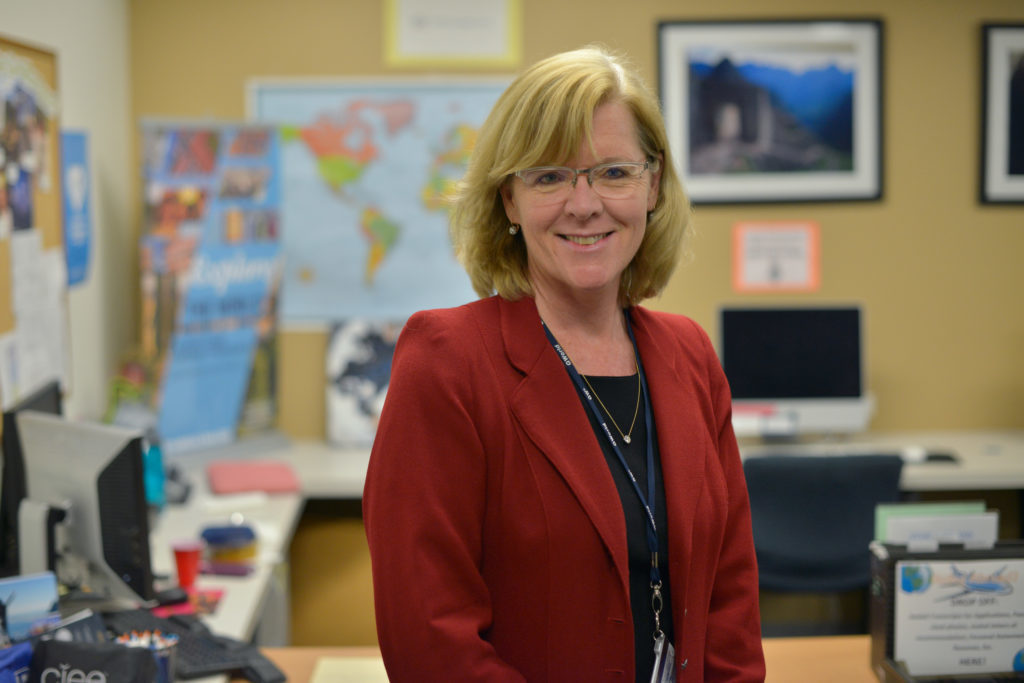In her first four months leading the study abroad office, the new director has identified two top priorities: “access and inclusion.”
Maritheresa Frain, who filled a role that sat vacant for two years, said since stepping into her position in June she has been working to expand the number and type of students who choose to study abroad using data analysis and increased outreach to students. Frain said that after working for study abroad companies, she wanted to come to an institution where she could make an “impactful presence” on students wishing to study abroad.
“I wanted to be at a school where I could walk through a four-year cycle with a student on how international experiences impact them,” Frain said.
The University launched its search for a new study abroad director in January, a year after former director Rob Hallworth left for a new job opportunity in January 2017. Donna Scarboro, the associate provost for international programs, led the search in a committee comprised of faculty, staff and officials.
Frain said when she assumed her role, she was surprised by the lack of longitudinal data about what kinds of students study abroad and the number of applicants for particular programs. Data on the study abroad website has not been updated since 2012.
She said study abroad employees began conducting a “deep dive” into the University’s data to determine trends in the number and type of students who study abroad. Since beginning the data collection, Frain said she found that the percentage of female and male students studying abroad stands at about 75 and 25 percent, respectively – a standout from the national average of 66.5 percent of females and 33.5 percent of males who typically study abroad, according to the Institute of International Education.
Frain said officials will publish the finalized data on the study abroad website by the end of the month.
“I see that as an interesting challenge – to engage with males on campus and try to figure out, ‘What is it? Why aren’t you studying abroad? What is it that we’re not doing?’” she said. “Because there has to be a disconnect there somehow.”
Officials are forming focus groups to identify ways to market study abroad opportunities to a greater demographic of students, she said.
When Frain took on the role over the summer, she said she began upping the number of employees in the office, collecting data to update the study abroad website and scoping out new scholarship opportunities for students to go abroad without a financial burden.
Frain added that she entered an understaffed department over the summer, and the office will onboard two new employees on Oct. 29. One of the new employees will serve as the manager of the advising team, and another will manage the global bachelor’s program and the Focus on Fall Abroad Community program, she said.
Frain, who speaks five different languages, said she will also go abroad in November with three professors to review the University’s exchange program in Chile. The stop will be the first of several visits to GW-sponsored programs in places like London and Madrid, so officials can conduct a regular review of GW’s international programs, which are typically conducted every five years to pinpoint which programs are a “fit” for the students who enroll, she said.
“That’s my first experience – seeing what a GW-branded program looks like and understanding the opportunities that offers GW and our students,” Frain said.
Frain said she is also aiming to expand the number of scholarships offered to students who want to study abroad – with part of her focus on expanding access to students who may come from low-income families or are first-generation students who might not be able to afford abroad programs. She said she wants to increase funding for the global bachelor’s program, which sends students abroad for three semesters, to allow students eligible for Pell Grants to enroll.
She added that one of her top priorities for study abroad programs is “opening up access” to students who may not have the required grade-point average to enroll in certain study abroad programs. Currently, students in “good academic standing” – with a 2.0 GPA – are allowed to study abroad, but the GPA minimum varies depending on the study abroad program. Frain said she wants to ensure officials are “talking about good academic standing in a very supportive and positive way” so students will be able to study abroad.
“We tend to sometimes in academia be a little bit elitist around GPAs, and I would prefer that we be democratic in the fact that everybody gets their degree,” Frain said. “So if you talk about that in a way that would help students come here and talk to us, we could find them the best fit.”
Cameron Cumberland, a data analyst who worked in the study abroad office from June until last week, said before Frain took over as director, office employees didn’t know how to communicate complaints to officials or whether they were doing their jobs correctly because there was no one leading the office. He said staff have been “very relieved” that they now have more support from a new director and more personnel coming into the office.
“People seem to be more hopeful that things are changing and things are changing with their input for the better,” he said.
Lizzie Mintz contributed reporting.




